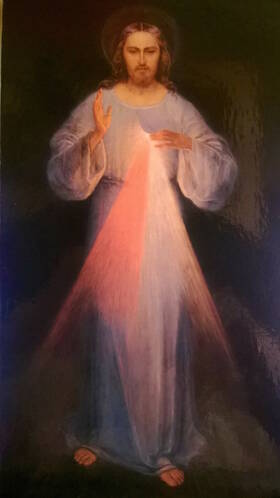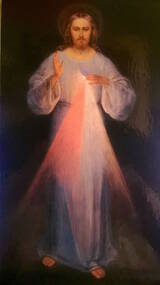
Divine Mercy Prayers
Currently Totus2us has the Divine Mercy chaplet in 12 languages: Arabic, Czech, English (also in chant), French, German, Greek, Italian, Latin, Polish, Portuguese, Slovak and Spanish.
The Divine Mercy Novena (which Jesus asked St Faustina to pray most especially from Good Friday to Divine Mercy Sunday) is in English, French, Italian, Portuguese & Spanish.
Our hope is to have the chaplet and novena in all the languages of the world! If you might be able to help with a language not yet included, please do contact the Totus2us team. Many thanks to everyone who has helped with these recordings; an especial thanks to Father Georgios Dagas who organised & recorded the Greek translation of the chaplet. The background music is sung by Anna Johnstone.
You can subscribe to this podcast, Jesus I trust in you, on Spotify, here on itunes or here on Totus2us' RSS feed. To download the free mp3 audio recordings individually, right / double click on the blue play buttons.
The Feast of Divine Mercy (2nd Sunday of Easter) was first celebrated in the Jubilee year 2000, when Pope St John Paul II canonized the first saint of the new millennium, Faustina Kowalska, the apostle of Divine Mercy. JPII died on the vigil of this feast in 2005; Benedict XVI beatified him on Divine Mercy Sunday 2011. Pope Francis celebrated his first Mass at St John Lateran Basilica as Bishop of Rome on this feast 2013, he canonized John XXIII & John Paul II on Divine Mercy Sunday 2014, & in 2015 gave the Bull of Indiction about the Jubilee of Divine Mercy.
The Divine Mercy Chaplet
The Feast of Divine Mercy
Feast Day - 8th day of Easter, 2nd Sunday of Easter
Blessed John Paul II died on the vigil of Divine Mercy Sunday, 2 April 2005, & was beatified on the Feast of Divine Mercy, 1 May 2011
3 2us by Father Piotr Prusakiewicz CSMA ![]()
"Mercy is the second name of love; it is love which gives itself, love in action. We celebrate the Feast of Divine Mercy, we worship the mercy of the Father who gave His Only Son; the mercy of the Son Jesus who is Mercy Incarnate Himself, who gave His life for us; and the mercy of the Holy Spirit because God's love is poured out into our hearts by the Holy Spirit. This Sunday is called Divine Mercy Sunday and, according to the diary of St Faustina, this is the day when God pours out a whole ocean of graces on those who approach the fount of His Mercy."
Many thanks to Burke Ingraffia for the gift of his music - 'Divine Mercy'.
Sunday Evangelium by Father Andrew Pinsent ![]()
"Since the Great Jubilee of 2000 this, the second Sunday of Easter, has been called Divine Mercy Sunday. The Divine Mercy is a devotion centred on the infinite mercy of God for sinners. It's visual focus being an image painted under the guidance of a Polish nun, St Faustina Kowalska. St Faustina had an inspired vision of blood and water radiating from the pierced heart of Jesus Christ. Seeing these white and red rays as an ocean of mercy for the whole world. Pope John Paul II strongly encouraged this devotion. His death on the vigil of Divine Mercy Sunday 2005 and his subsequent beatification on this same feast day in 2011 may also be interpreted as signs of the importance of this devotion today."
Saint Maria Faustina Kowalska
3 2us by Monsignor Keith Barltrop ![]()
"It's a message that although we have so much to distrust in ourselves, we can have an absolute complete confidence in God's mercy towards us. St Faustina was not only the 'secretary', the mouthpiece of this message, but she lived it herself in the convent, through many ups and downs, as did Saint Thérèse. .. Eventually, thanks to the very providential appointment of John Paul II as Pope, these messages became known and accepted, and with them obviously it was only right to honour St Faustina, the very unknown, humble saint."
Saint John-Mary Vianney (Curé of Ars) - Sermon for the 3rd Sunday after Pentecost:
"The way Jesus Christ acted during his mortal life shows us how great was his mercy towards sinners. We see how they all come to share his company and how he, far from turning them away or at least keeping his distance from them, to the contrary takes every possible means to draw them to his Father. He goes searching for them through compunction, gathers them together by his grace and wins them by his loving behaviour. He deals with them with such kindness that he even stands up for them against the scribes and Pharisees, who wish to accuse them and seem not to want to endure them in Jesus Christ's company.
He goes even further than this: he wants to justify the behaviour he adopts towards them with a parable that shows them in an insurpassable way the greatness of his love for sinners, saying to them: "A good shepherd with a hundred sheep, having lost one of them, left all the rest to pursue the one that had strayed, and having found it he placed it on his shoulders to spare it the difficulty of the road. Then, when he had restored it to its fold, he invited all his friends to rejoice with him at having found the sheep he had thought to be lost." He also adds that parable of the woman who, having ten drachmas and losing one of them, lights her lamp to look for it in every corner of the house, and when she has found it invites all her friends to rejoice with her. "This is how," he says, "all heaven rejoices at the return of a sinner who is converted and repents. I have not come to call the righteous to repentance, but sinners. Those who are healthy do not need a physician, but the sick do" (Lk 5,31-32).
We see how Jesus Christ applies to himself these vivid images of the greatness of his mercy towards sinners. Oh what happiness for us to know that God's mercy is infinite! What impetuous desires we must feel arising within us to go and throw ourselves at the feet of a God who will welcome us with such great joy!"

